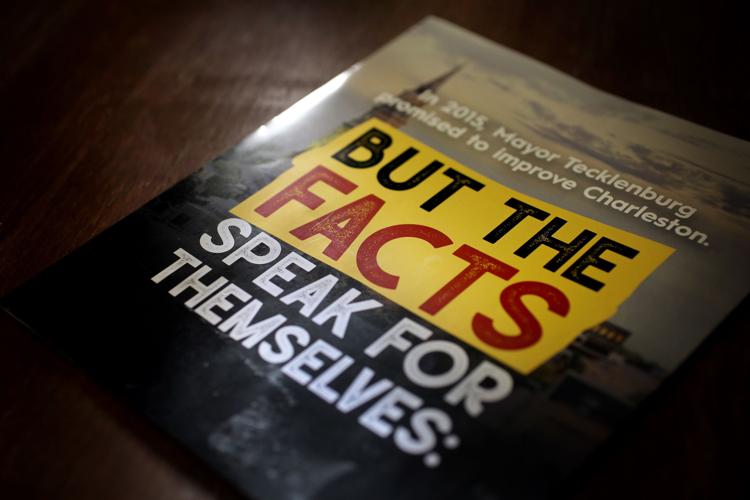Dark money has entered Charleston’s mayoral race for the second time in two decades, and Mayor John Tecklenburg, who is being targeted by the anonymous spending, called it "gutter politics."
City Councilman and mayoral challenger Mike Seekings, one of the six candidates running for the mayor's seat, denied involvement in the group, which is not subject to state ethics laws on disclosing contributors or limiting their donations to $1,000 apiece.
One mailer, sent from "Citizens for a Better Charleston, LLC" criticizes Tecklenburg for “failing to keep his promise to a woman he committed to care for.” A second mailer hit boxes Wednesday. Both the mailer ads and the one on the radio cite news organizations for the information, including The Post and Courier and WCSC-TV.
The limited liability company was registered by Jefferson William Leath, a former law partner of Seekings. Reached Wednesday at a phone number at the Seekings law firm, Leath said there's no connection between his group and Seekings' campaign, though he personally supports Seekings in the race. Leath shares office space with Seekings, too, though the group lists a post office box at the United Parcel Service store on Market Street.
"He and I used to be partners, but we dissolved that in 2018," Leath said. "We do work together from time to time, but this is an independent operation with our own consultants."

Charleston Mayor John Tecklenburg and Councilman Mike Seekings are the two candidates in the 2019 mayoral runoff election. File
Seekings declined an interview request but did send a statement saying his campaign had nothing to do with the mailer.
"We found out about the piece the way everyone else did. If the mayor wants to challenge any of the information put forward, including regarding the apparent financial self-dealing for which he was sanctioned by the probate court, he should take it up with the entity that produced the mailer," the statement said. "We remain focused on our own campaign and sharing a real plan to tackle issues like flooding, traffic and overdevelopment."
Leath said those involved in Concerned Citizens of Charleston are a group of "prominent local citizens" but would not identify those in the group or how they had raised and spent.
"I want to dispel the notion that this is dark money. This is straight up facts. Everything out there is factual and it is all footnoted as such," Leath said. "Charleston is at such a crucial point it has to see a change."
Dark money is an often-used term to describe third-party political campaigns that operate outside state or federal regulations on spending limits and identifying donors. A series of court rulings made this sort of spending legal during the past decade, though some lawmakers have pushed, unsuccessfully so far, to regulate it.
The Concerned Citizens’ mailer lobs familiar criticisms against Tecklenburg: that traffic has worsened; that the city has not fixed its flooding problem; and that more hotels have been planned and built under his watch.
But it mostly faults Tecklenburg for his handling of an elderly woman’s finances. Last year, Charleston County Probate Judge Irvin Condon suspended Tecklenburg from managing an elderly woman’s finances after finding he made loans to himself from her funds without getting prior approval from the court.
“The transactions show apparent self-dealing,” Condon wrote. “The transactions show that John Tecklenburg made unsecured loans to himself and his family members’ businesses.”
Tecklenburg said he paid back the loans on time and with interest, but the flier says, “Where did the money go? Money for his wife’s business and a property for him.”
Tecklenburg said he recognized Leath's name but that he didn't know him. As far as the flier's mention of the estate case, Tecklenburg said, it's "really sad someone is resorting to that."
It’s not a surprise that dark money has entered the mayoral race. Dark money recently was an issue in the Charleston County School Board elections and has been an issue statewide.
Dark money first surfaced locally during Mayor Joe Riley’s last re-election campaign in 2011, when an identically named group, Citizens For a Better Charleston, sent out a flyer attacking Riley and praising one of his opponents. Leath said he was not involved in that effort.
Federal court rulings have found that such spending is protected under the First Amendment, so groups may operate outside existing campaign disclosure laws. In South Carolina, those laws are overseen by the State Ethics Commission. The commission's website had no filings related to Citizens for a Better Charleston as of Wednesday.
Riley forcefully attacked the Citizens For a Better Charleston spending at the time, holding a press conference in front of the Market Street post office box and declaring the fliers a “supreme act of political cowardice.”
While six candidates — including City Councilman Gary White, former Councilman Maurice Washington, newcomers Sheri Irwin and Michelle Renee Orth — are in the race, only Tecklenburg and Seekings have raised big money and done extensive advertising.
The election is Nov. 5, and if no candidate gets more than 50 percent of the vote, the top two vote getters will meet in a Nov. 19 runoff.
Robert Behre contributed to this report.











